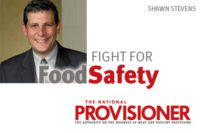Fight for Food Safety
Contain your food-safety risk

One way to reduce your overall business risk is to produce a safer product. Sometimes, however, outbreaks occur despite your best efforts, and products are recalled. When this happens, companies are increasingly confronted with foodborne illness lawsuits from sickened consumers and significant commercial recall claims from customers. And, on the regulatory side — as demonstrated in the recent Jensen Farms, Blue Bell, ConAgra and Chipotle cases — the government is now initiating criminal investigations against food companies when their products cause human illness.
Processors can better control these risks through the use of two critically important tools: (1) sophisticated supplier agreements, and (2) adequate insurance coverage. Although some companies have some type of continuing guarantee or hold-harmless agreement with their suppliers, these contracts are, in many cases, woefully inadequate. The agreements often are too vague or the indemnity and/or guarantee language has gaps or is not sufficient to provide the desired protections.
The basic elements of such an agreement should include: (1) a detailed outline of your expectations as it relates to the quality, safety and testing attributes of the ingredients being supplied; (2) a continuing guarantee promising the ingredients comply with all relevant laws and will not be adulterated or misbranded; (3) strong indemnity provisions that transfer any potential liability to your suppliers for any breach of those guarantees; (4) a provision that calls for the recovery of attorney’s fees relating to any such breach; and (5) a choice of law and venue provision that requires your suppliers to litigate any disputes in a court of your choice (i.e., your “home court”).
When it comes to insurance, many companies have significant gaps in their coverage. It is critically important to ensure both you and your suppliers have adequate levels of both product liability and recall coverage. In many outbreaks, the available product liability insurance is not enough to cover all the claims, and in most cases the companies involved have no recall insurance at all. So in your supplier agreements, make sure to include provisions also requiring your suppliers to carry minimum levels of product liability and recall insurance.
With strong supplier agreements you will decrease the likelihood you are sold a dangerous product. In the unlikely event you are, those agreements (and the right types of insurance) can ensure you weather any resulting crisis. Carefully review your existing agreements and insurance, and be sure to adequately contain your food safety risk — before it contains you. NP
Looking for a reprint of this article?
From high-res PDFs to custom plaques, order your copy today!






